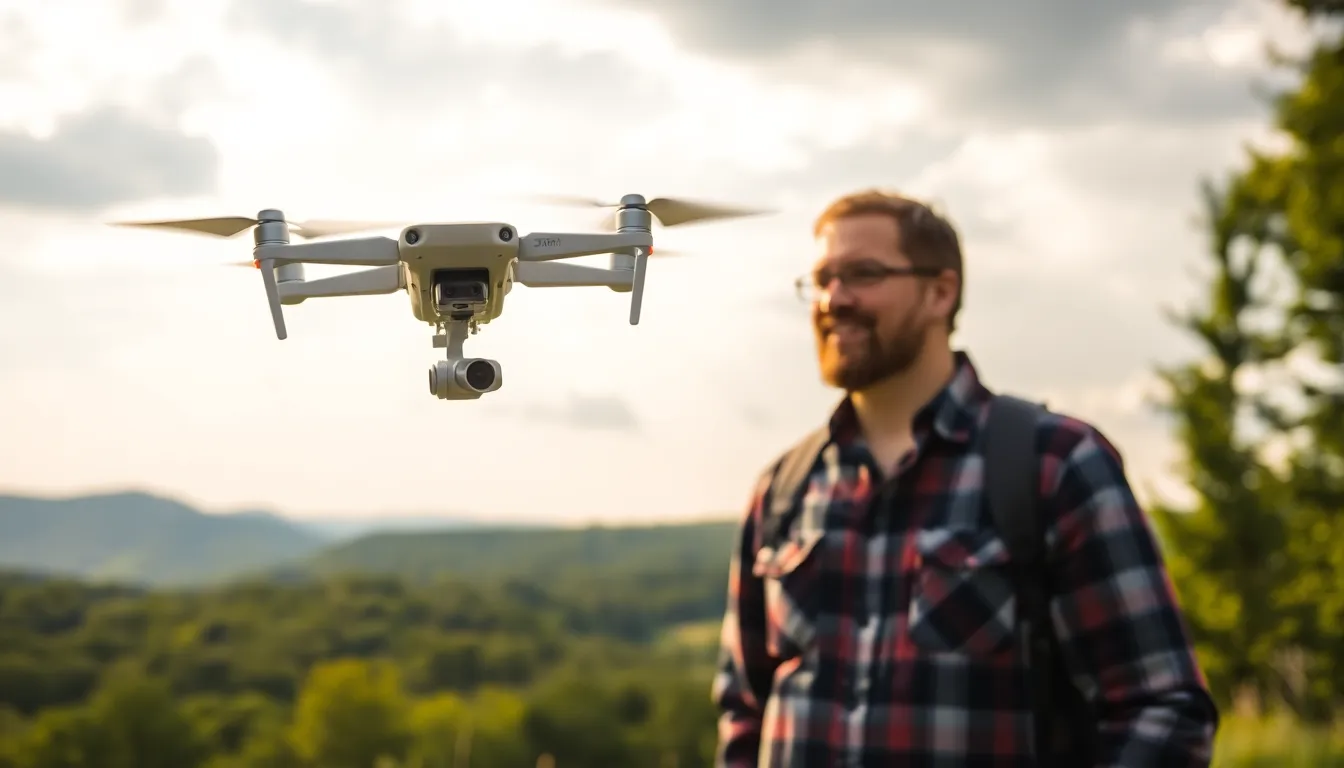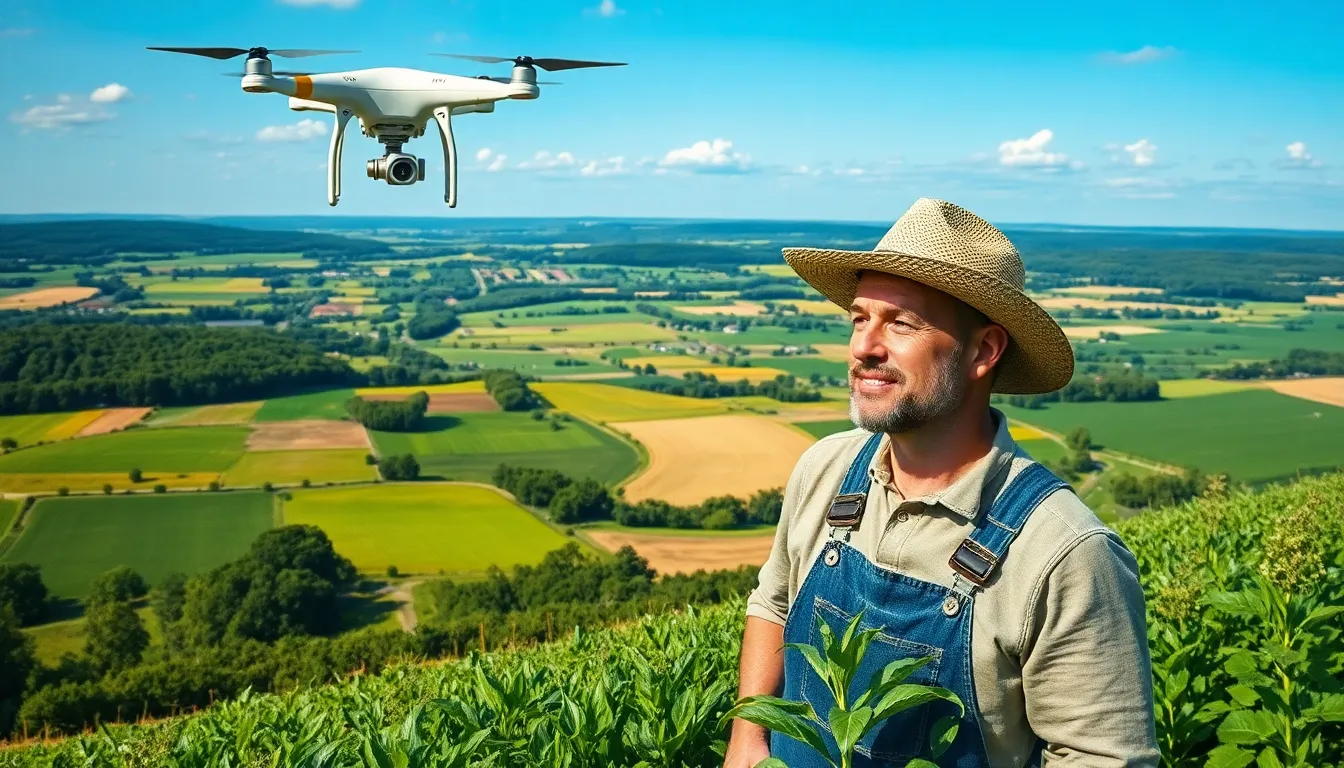In the picturesque landscapes of Vermont, drones are taking flight and changing the game. These buzzing little gadgets aren’t just for tech enthusiasts or filmmakers; they’re becoming essential tools for farmers, real estate agents, and even local breweries. Imagine capturing stunning aerial views of lush green fields or showcasing a cozy cabin from above. It’s like having a bird’s-eye view without the hassle of actually being a bird.
Table of Contents
ToggleOverview of Drones VT
Drones are transforming various sectors in Vermont. These innovative devices enhance traditional activities by introducing advanced functionalities. In agriculture, farmers utilize drones for crop monitoring and precision agriculture, which improves yield and reduces waste.
Real estate agents use drones to capture stunning aerial images of properties, providing potential buyers with an engaging perspective that static images cannot offer. Local breweries deploy drones to market their establishments, showcasing the landscape and ambiance through captivating aerial videos.
Emergency services integrate drones into their operations for search and rescue missions. Using drones allows responders to cover large areas quickly and efficiently. Additionally, conservation efforts benefit from drone technology, enabling specialists to monitor wildlife habitats without disturbing the environment.
Recent studies indicate that the drone industry in Vermont is growing at a rapid pace. Recent data shows a 40% increase in drone registrations over the past two years. This trend highlights the rising interest in leveraging drones for diverse applications.
Local regulations are adapting to accommodate the expanding use of drones. The state encourages responsible usage through educational programs and training courses that inform operators about safety and compliance guidelines.
Community events now feature drone demonstrations, showcasing the impressive capabilities of these devices. Workshops and exhibitions also foster collaboration among various sectors, promoting innovation and the sharing of best practices.
Types of Drones VT

Drones in Vermont come in various types, each serving distinct purposes. Understanding these types aids businesses and consumers in selecting the right model for their needs.
Consumer Drones
Consumer drones represent a growing segment in Vermont’s drone market. These models cater to hobbyists and recreational users, offering features suitable for photography and videography. Many consumers choose these drones for their ease of use and affordability. With models like DJI Mini and Parrot Anafi available, photographers capture stunning aerial visuals. Additionally, community events often showcase these drones, promoting their popularity among enthusiasts. Many local clubs engage members through friendly competitions, fostering a vibrant drone culture.
Commercial Drones
Commercial drones play a significant role in Vermont’s economy. Industries such as agriculture, real estate, and emergency services utilize these advanced models for specific applications. In agriculture, farmers employ drones for precise crop monitoring, enhancing yields through data collection. Real estate agents use commercial drones to create immersive aerial tours, attracting potential buyers. Emergency services benefit from rapid deployment in search and rescue operations, improving response times in critical situations. A notable increase of 40% in drone registrations over the past two years indicates strong growth in this sector, affirming the importance of commercial applications.
Applications of Drones VT
Drones are becoming essential tools across various sectors in Vermont. Their versatile applications significantly enhance efficiency and innovation.
Agriculture
Farmers in Vermont utilize drones for precision agriculture. These devices enable crop monitoring through aerial imagery, allowing for better analysis of plant health. Data gathered from drones helps in identifying pests and diseases early on, resulting in more timely interventions. Many farmers report improved yields due to optimized resource management fueled by drone insights. Enhanced irrigation practices also benefit from drone surveillance, ensuring water distribution occurs where needed most.
Construction
Construction companies in Vermont increasingly rely on drones for site surveys and inspections. Aerial imagery captures site progress accurately, streamlining project management. These advanced tools facilitate mapping and modeling, providing accurate topographical data. Drones enhance safety by identifying potential hazards before work begins. Project timelines often shorten as aerial perspectives provide real-time data that keeps teams informed.
Photography and Videography
Photographers in Vermont leverage drones to capture breathtaking aerial images. Unique perspectives contribute to stunning landscape photography, appealing strongly to clients. Videographers benefit as drones enable cinematic shots that were once costly and challenging to achieve. Real estate agents use these capabilities to create engaging property listings, showcasing homes and surroundings from above. The demand for drone photography continues to grow as various industries recognize its marketing potential.
Regulations for Drones VT
Vermont’s drone regulations are evolving to accommodate the rapid growth of their usage across various sectors. The Federal Aviation Administration (FAA) sets the foundational guidelines for drone operation, requiring pilots to follow specific rules. Pilots must register drones weighing over 0.55 pounds, which ensures accountability within the airspace.
Local laws supplement federal regulations by addressing state-specific concerns. For instance, flying drones over private property without permission constitutes an invasion of privacy, so operators should seek consent when necessary. Additionally, drone flights within five miles of airports require notification to the airport operator, promoting safety and reducing risks.
Training programs offer valuable resources for drone operators. Educational courses teach participants about safe flying practices, airspace regulations, and best usage, fostering a responsible drone culture. Local community events further support this initiative by providing hands-on demonstrations that enhance operator skills.
In Vermont, enforcement of these regulations emphasizes public safety. Violations can lead to penalties, reinforcing the significance of adherence to guidelines. Compliance encourages responsible drone operation, enabling users to take advantage of the expansive benefits drones provide.
Organizations within the state, including the Vermont Agency of Transportation, play crucial roles in promoting awareness and facilitating responsible drone use. Collaboration between agencies fosters innovation and encourages best practices among drone operators. Overall, regulations create a framework that balances technological advancements with public safety and privacy concerns.
Future Trends in Drones VT
Innovative developments in drone technology continue to shape the landscape in Vermont. One significant trend involves the integration of artificial intelligence and machine learning in drone systems, allowing for enhanced data analysis and automated decision making. Farmers benefit from drones equipped with these technologies, enabling them to monitor crops more efficiently and identify issues in real-time.
Another emerging trend includes the expansion of drone delivery services. Companies are piloting programs for the fast delivery of goods, minimizing transportation time and costs. Local businesses are exploring these options, enhancing customer experiences with quick access to products.
Drones are also expected to play a crucial role in environmental monitoring. Conservationists utilize UAVs to assess wildlife habitats and track climate changes with increased precision. By gathering critical data with minimal disturbance to ecosystems, these devices support sustainable practices.
In construction and infrastructure, adopting drone technology will become more widespread. Companies increasingly rely on drones for building inspections, allowing for safer, quicker evaluations of sites. Enhanced visual data also assists project managers in making informed decisions, improving transparency and accountability.
Regulatory frameworks are likely to continue evolving to keep pace with technological advances. Stakeholders expect updated guidelines that promote safe drone usage while encouraging innovation. As training programs expand, operators gain crucial skills to navigate local regulations effectively.
Community engagement with drones also grows, fostering collaborations among industries. Schools and educational programs incorporate drone technology into curriculums, preparing future generations for careers in this dynamic field. Such initiatives strengthen the local drone culture and inspire innovation across sectors.
Drones are reshaping Vermont’s landscape across various industries. Their versatility is evident in agriculture real estate and emergency services where they enhance efficiency and innovation. As the drone industry continues to grow local regulations are adapting to ensure safety and responsible usage. The rise in drone registrations reflects a community eager to explore new applications and technologies.
Looking ahead the integration of advanced technologies like artificial intelligence promises to further revolutionize how drones are utilized. This evolution not only benefits businesses but also fosters a vibrant drone culture within Vermont. With continued community engagement and education the future of drones in the state looks promising and full of potential.


